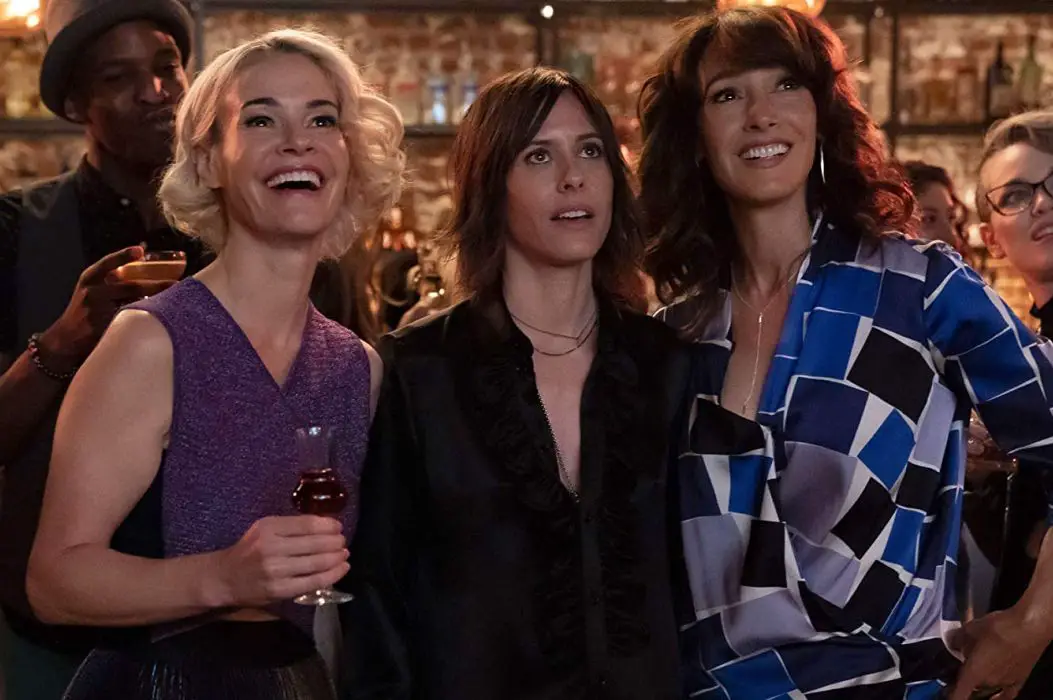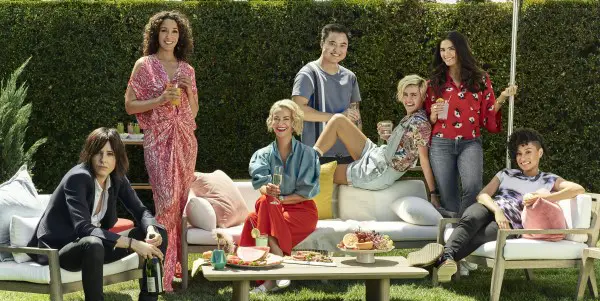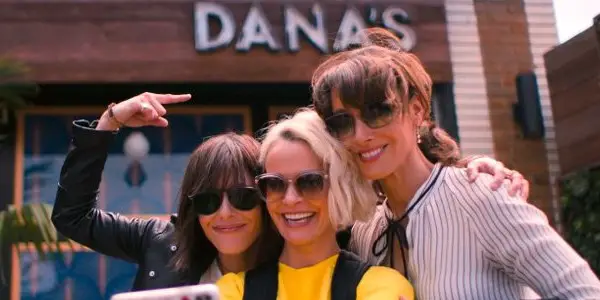THE L WORD: GENERATION Q Season 1: Exploring Taboos & Difficulties Of The LGBTQ+ Community

Zofia lives in LA and is passionate about pop culture,…
When someone mentions Coffee Planet, at least one lesbian grins and nods her head with enthusiasm. The scenery of Los Angeles from the 2000s, gay bars, successful women – those components are still in the memory of the loyal fans.
Showtime answered the pleas of many – the return of Alice, Bette, and Shane alongside new, engaging characters graced the small screens in the sequel, The L Word: Generation Q.
Let’s Do It All Over Again!
It’s been 10 years since the audience said good-bye to Bette (Jennifer Beals), Tina (Laurel Hollowman), Alice (Leisha Hailey), Shane (Katherine Moennig), Jenny (Mia Kirshner), Kit (Pam Grier), and their group of best friends. But, as the new decade dawns, favorite characters of gay fans all over the world are back. They are older, wiser, even more successful then we all remember.
After divorce, Bette decides to fight for the position of Mayor of Los Angeles. The woman must focus on the campaign and Angie (Jordan Hull) – the daughter that she’s raising with Tina. Alice is a very successful journalist – she has her own talk show. After years of searching for the greatest significant other, the female character finally finds her. Alice now shares her life with Nat (Stephanie Allynne). With that – the unexpected matters of motherhood and even more.
In the first episode, Let’s Do It Again, Shane comes back to the City of Angels. The reunion with best friends would be everything if it’s not for the person who keeps texting her. While getting used to the old life, Shane makes an unexpected business decision. Juggling the development of the business and moving to the apartment, the woman also needs to deal with the personal demons that Los Angeles loves to wake.

The characters that we all came to love blend well with the younger ones – the past meets the present. Dani (Arienne Mandi) and Sophie (Rosanny Zayas) are a young couple that lives with Micah (Leo Sheng) in Hollywood. As millennials, they not only tell their stories but also portray the struggle of a young person, trying to make it in the City of Angels. The movies are not always right – it is harder than they depict in the film industry.
The character that is a definition of a modern millennial is Finley (Jacqueline Toboni) – the friend of the trio mentioned above. Alice, Bette, and Shane are all successful – they’ve worked hard on their lives, which the primary creator, Ilene Chaiken, depicted in the 2000s series.
In The L Word: Generation Q, the viewers have an opportunity to observe women who made it in Hollywood and the women who are still working towards their goals. The diversity of female characters at various levels of social classes is a significant element that can contribute to the positive impact of the series on the community, primarily LGBTQ + women of the population living in Los Angeles working in the entertainment industry.
Ladies of The City of Angels
But before we start reflecting on the more profound meaning and the influence of the series, let’s examine the cast. The return of three main actresses – Jennifer Beals, Leisha Hailey, and Katherine Moennig marks a new era – a new decade for lesbians. All women who watched The L Word as it aired are older now – many of them realized their sexuality because of the series and have grown up since.
Throughout the years, however, younger members of the LGBTQ+ community were coming back to this series because it’s one of the best (if not the best) shows for, by, and about lesbians. The writers, in addition to the known characters, are now delivering a fresh breeze in the shape of young, ambitious women who expose their lives and all the challenges they are facing.
The young cast – Jacqueline Toboni, Rosanny Zayas, Arienne Mandi, and Leo Sheng convey first-class performances. As Finley, Toboni does an extraordinary job, her portrayal of Finley makes her a warm, hilarious, and smart person. Her character, lost in their life, experiences a wide range of feelings as the plot goes on.
In this season, we also see more of Angie – Bette and Tina’s daughter. She’s on her way to becoming a young adult and has to deal with it while supporting her mom. It’s Jordan Hull’s first role, but she’s a natural. She delivers a well-crafted, developed character.

All of them work in different fields. As the story moves along, they make mistakes and get to learn from them. One of the central themes of the season is power. What happens if it consumes the person and overshadows their common sense?
Laws of Diversity Matter
One factor has always been the domain of the series, even in the show from ten years ago – diversity. Although The L Word converges on lesbian characters, Gen Q doesn’t lack trans members of the community. We’ve been graced by the role of Max (Daniela Sea) first. He came from the small town where his family disowned him, and, with the help of Jenny, he made it to Los Angeles.
Max may have been a supporting character, however, his story and development was an integral part of the series’ success. Years later, we have a chance to meet Micah, a trans man who lives with Dani and Sophie. He’s their best friend. His story centers on building a relationship with the neighbor next door (Freddy Miyares) as well as reaching further into his childhood and bond with his mother.

Diversity plays a crucial role in the series. Gen Q has a variety of races, genders, and sexualities that well-crafted characters proudly represent. People need to see themselves represented on the screen – The L Word: Generation Q does the LGBTQ+ community justice and possesses one of the most diverse, talented casts.
This also adds to the season working so well. The creators packed the show with drama and plot twists, and the story further touches upon important subjects that were previously taboo. It normalizes matters such as the relationship between three people, a mother who can have both the career and kids, the morality of people in politics and more.
For the LGBTQ+ community, The L Word was a precursor of change, acceptance, and increased tolerance. While watching it, many realized their sexuality and further explored it with the help of the characters. The lives of a group of friends, living in Los Angeles, will always be remembered since they were one of the most popular ones to teach and normalize same-sex relationships and more.
The L Word: Generation Q returns to its roots with the return of Bette, Alice and Shane. But more importantly, it paints a true picture of the younger LGBTQ+ community living in the City of Angels. The second season was just announced and with that, viewers will get more drama, more diverse cast, and will continue to stimulate conversation on difficult subjects – there is no doubt about that.
What do you think of The L Word: Generation Q? Who was your favorite character? Are you looking forward to next season?
https://youtu.be/brkZIIwZvqM
Does content like this matter to you?
Become a Member and support film journalism. Unlock access to all of Film Inquiry`s great articles. Join a community of like-minded readers who are passionate about cinema - get access to our private members Network, give back to independent filmmakers, and more.
Zofia lives in LA and is passionate about pop culture, television. and Stevie Nicks. She graduated from the University of Wroclaw, Poland with a Bachelor’s Degree in Journalism and Social Communication with Creative Writing. Her work revolves around women in television and film. She is a staff writer First Showing and Contributing Writer for AwardsWatch, Film Inquiry, Screen Queens, and In Their Own League. She loves the 'Scream' movies, 'Carol' and 'Big Little Lies'. – @thefilmnerdette













